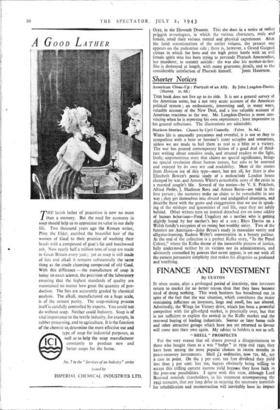Horizon Stories. Chosen by Cyril Connolly. ;Faber.. 8s. 6d.)
WHEN life is unusually precarious and eventful, it is not so dasy to sympathise with a hero or heroine's inner scruples and sensations, unless we are made to feel them as real as a blitz or a victory. The war has pruned contemporary fiction of a good deal of third- rate writing about sensitive souls, and attuned readers to the light, lively, unpretentious story that claims no special significance, brings no special revelation about human nature, but asks to be assessed and enjoyed by its own wit and readability. Most of the stories from Horizon are of this type—most, but not all, for there is also Elizabeth Bowen's poetic study of a melancholy London house changed by war, and Antonia White's remarkable story of the crisis in a married couple's life. Several of the stones—by V. S. Pritchett, Alfred Perlis, J. Madaren Ross and Arturo Barea—are told in the first person ; the narrators make no claim to be remarkable in any way ; they get themselves into absurd and undignified situations,. and describe these with the gusto and exaggeration that we use in speak- ing of the mishaps and ignominies of real life, once they are safely behind. Other writers turn an ironical detached eye on some oddity of human behaviour—Fred Urquhart on a mother who is getting slightly bored by her mother's boy of a son ; Rhys Davies on a Welsh family's reception of an erring but wealthy sister. Two of the funniest are American—John Bryan's study in masculine vanity and alligator-hunting, Eudora Welty's conversation in a beauty parlour. At the end of the collection is a perfect Kafka story, "In the Penal Colony," where the Kafka theme of the inexorable process of justice, fully understood neither by its victims nor its administrators, and ultimately controlled by powers that never appear, is set out with all the earnest persuasive simplicity that makes his allegories so profound and terrifying.


























 Previous page
Previous page